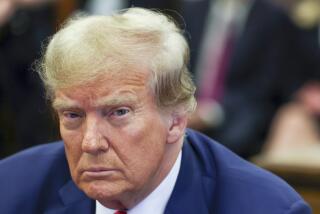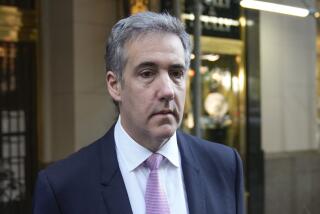Defense Rests as Iran-Contra Trial Nears End : Law: CIA Director Gates is not called as witness in coverup case. The jury may begin deliberations Thursday.
- Share via
WASHINGTON — The monthlong trial of retired CIA official Clair E. George neared its conclusion Monday as defense attorneys rested their case without calling CIA Director Robert M. Gates to testify.
U.S. District Judge Royce C. Lamberth scheduled closing arguments for Wednesday, telling jurors that they will begin their deliberations Thursday. He planned to meet with lawyers today to discuss the legal points to be included in his jury instructions.
Richard A. Hibey, George’s principal attorney, would not say why he chose not to call Gates as a defense witness just a few days after winning the right to do so.
The judge, in upholding a defense subpoena of Gates over government objections, had said that he believes the CIA director was “up to his eyeballs” in knowledge of the Iran-Contra affair and could help George’s defense.
One explanation for Hibey’s change of heart might have been remarks by Justice Department attorneys last week that testimony from Gates, who would have been a hostile witness, would hurt George more than help him.
George faces nine felony counts of lying and obstructing congressional and grand jury investigations into a major foreign policy scandal of the Ronald Reagan Administration.
The affair involved a secret deal to sell illegal arms to Iran in 1985-86 in exchange for U.S. hostages and then to divert the profits--also illegally--to aid anti-Sandinista rebels in Nicaragua.
The charges include accusations that George directed a cover-up of the arrangement masterminded by White House aide Oliver L. North. At the time, George was the CIA’s deputy director for operations, the No. 3 post in the agency.
George, the most senior agency official to be charged in the scandal, took the witness stand in his own defense last week, insisting that he never lied but only made innocent mistakes or answered questions too cautiously in his effort to protect the CIA.
Before resting his case Monday, Hibey called four final witnesses to authenticate documents suggesting that George did not bear sole responsibility for informing Congress about crucial events.
He introduced a July, 1987, CIA inspector general’s report, for example, that said William J. Casey, the late CIA director, had been the “senior officer most informed about the Contra program.” The report said that Alan D. Fiers, chief of the Central American task force and the prosecution’s star witness, often dealt directly with Casey and bypassed the chain of command, including George.
Hibey has sought to show jurors that Fiers did not tell George everything he knew about North’s secret program for resupplying the Contras. Fiers pleaded guilty to two criminal charges last year and agreed to cooperate with the government.
Prosecutors also summoned a final rebuttal witness, former Senate staff member Robert E. Simmons, who testified that George “was not truthful” in their frequent personal dealings on CIA matters in the early 1980s. Simmons at the time was staff director of the Senate Intelligence Committee.
“Based on my experience with him, I would have some difficulty believing him, even under oath,” Simmons said of George.
More to Read
Sign up for Essential California
The most important California stories and recommendations in your inbox every morning.
You may occasionally receive promotional content from the Los Angeles Times.













